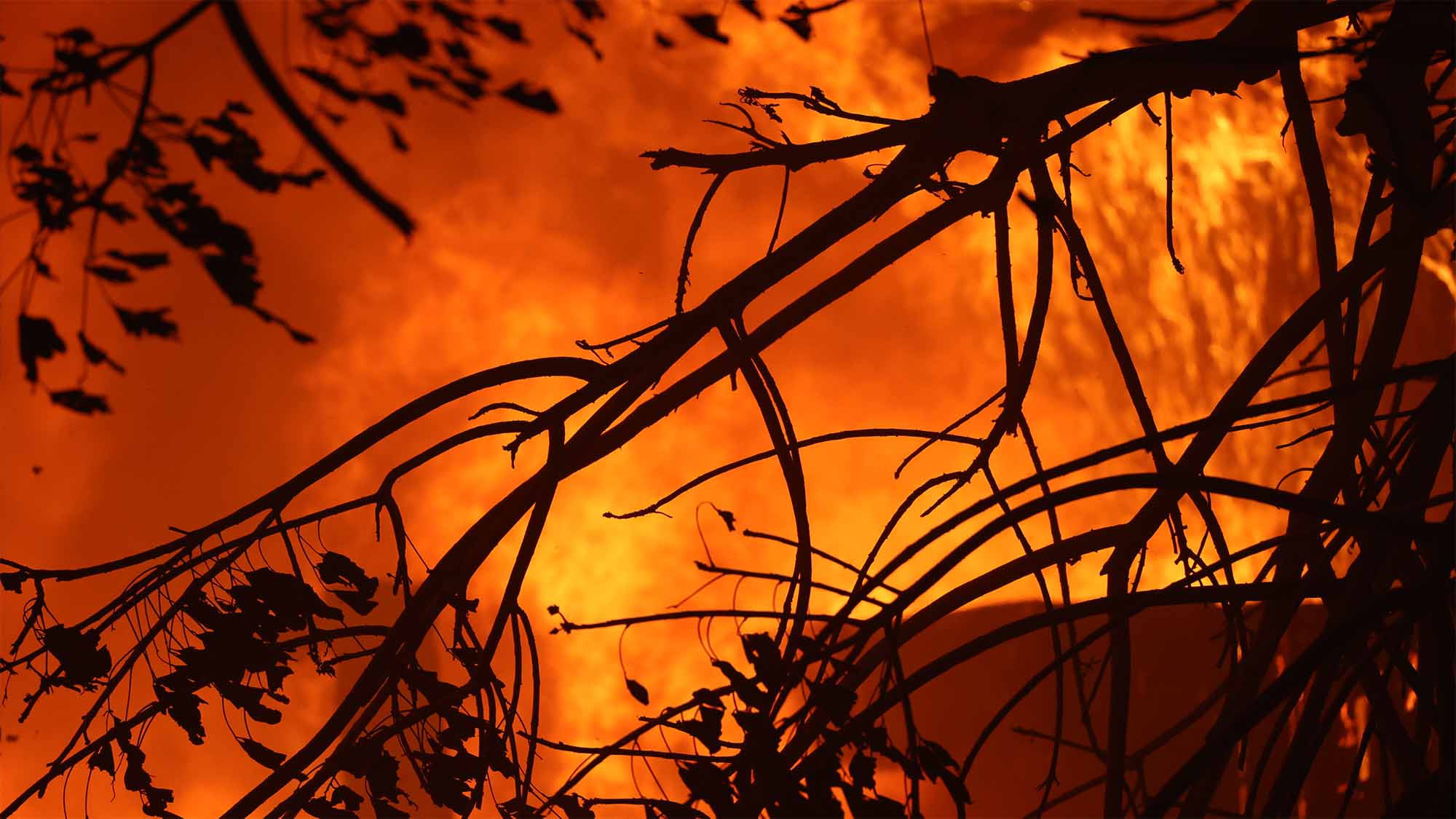Updated 3 p.m. Jan. 24: UC Davis Fire Department Capt. Steve Dunn returned to campus Wednesday night from his assignment battling the Eaton Fire in Los Angeles County, Interim UC Davis Fire Chief Nathaniel Hartinger said.
With his return, all UC Davis Fire Department personnel who were assisting in Southern California have returned safely to campus.
The Eaton Fire was still 14,000 acres but had reached 95% containment as of Thursday morning, Cal Fire said.
Updated 1:30 p.m. Jan. 21: UC Davis Fire Department Capt. Steve Dunn continues to battle the Eaton Fire in Los Angeles as the leader of a task force of personnel from the Lake Tahoe region, Interim UC Davis Fire Chief Nathaniel Hartinger said.
Hartinger said Dunn will likely be released from the fire later this week.
The blaze measured 14,000 acres and was 89% contained as of this afternoon, Cal Fire said.
Updated 1:30 p.m. Jan. 17: Most UC Davis Fire Department crews assisting with fire responses in Los Angeles County were released from their assignments yesterday (Jan. 16) and returned to campus last night, Interim UC Davis Fire Chief Nathaniel Hartinger said. The one exception is Capt. Steve Dunn, who continues to lead a strike team assigned to the Eaton Fire.
Returning to campus last night were Hartinger, who was assisting UCLA with its emergency response; and four firefighters aboard Brush Truck 34 who had also been fighting the Eaton Fire: Capt. Nate Potter, Engineer Erich Schultz, and Firefighters Chad Cunningham and Gerrit Dykzeul.
Cal Fire said this morning that the Eaton Fire was now 14,000 acres and 65% contained. Meanwhile, the Palisades Fire was nearing 24,000 acres with 31% containment.
Updated noon Jan. 14: Interim UC Davis Fire Chief Nathaniel Hartinger deployed to UCLA on Sunday (Jan. 12) as part of the effort to coordinate emergency response efforts on that campus. UCLA is adjacent to a Palisades Fire evacuation warning zone, and has moved classes remote through this week.
His trip to Los Angeles County adds to the five UC Davis Fire personnel who are on the front lines of the Eaton Fire. They are, aboard Brush Truck 34, Capt. Nate Potter, Engineer Erich Schultz, and Firefighters Chad Cunningham and Gerrit Dykzeul. Separately, Capt. Steve Dunn is leading a group of personnel from the Lake Tahoe area.
Those crews are continuing to work on structure defense and securing fire lines, Hartinger said.
Cal Fire said this morning that the Palisades Fire had grown to nearly 24,000 acres and was 17% contained, while the Eaton Fire was 14,000 acres and 35% contained. Hartinger said conditions in the area were improving.
On Friday, Provost and Executive Vice Chancellor Mary Croughan sent a message of support — with information on relevant resources — to faculty.
“My heart goes out to our fellow Californians and their families regarding the devastating losses so many are experiencing due to the fires in Southern California,” she said. “Wishing for the safety of those in areas affected by the fires and for those fighting the fires. Thank you to the Aggies who are stepping forward to help, and to all of you for the care you show to our colleagues, students, and entire Aggie family.”
EFFECTS OF WILDFIRE SMOKE
“These wildfires are different because they are burning houses and structures,” said Anthony Wexler, a distinguished professor and the director of the UC Davis Air Quality Research Center. “In houses, you have plastic, metal, solvents, carpets, paint, pesticides, cars with rubber and metal and everything else. And when those burn, they create more toxic smoke and ash.”
Updated 1:55 p.m. Jan. 10: The California Veterinary Emergency Team, or CVET, has moved to “on alert” status and is at the ready to provide veterinary assistance as needed via coordination or clinical care, but so far has not been activated to Southern California because regional programs there have been able to care for animals injured in the ongoing fires, Executive Director Michael Ziccardi said.
“Since being established in 2021, CVET has worked actively in each of California’s 58 counties to determine veterinary needs, provide support in planning, and standardize approaches to veterinary care in partnership with the local authorities, the California Veterinary Medical Association and regional Community Animal Rescue Teams and animal welfare organizations,” he said. “We are meeting daily with the organizations actively involved at each of the region’s 16 animal shelters, offering veterinary assistance and advice where needed. To date, the regional programs have done an excellent job caring for the injured animals, but we also know that that may change at any time and stand at the ready to provide whatever assistance they may need.”
Updated 11 a.m. Jan. 10: A UC Davis staff member is collecting pet supplies while another plans to work to keep bees safe in the areas affected by fires in Los Angeles County.
Pet supplies drive
Rachel Herstik, a large animal technician at the Veterinary Medical Teaching Hospital, is collecting donations of pet supplies that she plans to distribute during a visit next weekend to her hometown of Altadena, which has been ravaged by the Eaton Fire.
“I’ve lost count of my friends who have lost homes,” she said. “I felt really compelled to help. I knew my vet med community, being animal lovers like me, were compelled to help.”
She is requesting items for large animals:
- Halter and leads
- Blankets
- Fly Masks
- Buckets and straps
- Pitchforks
And for smaller pets:
- Dog food, cat food
- Collars
- Leashes
- Dog beds
- Blankets and towels
- Litter boxes and cat litter
- Dog poop bags
- Crates and pet carriers
- Toys
Herstik said she has already received supplies from colleagues and friends like members of the Dressage Club, which had already been planning to disband and is now donating its horse-related supplies to Herstik’s drive instead.
Anyone interested in donating items can contact Herstik by phone at 818-415-8014 to coordinate a drop-off at the School of Veterinary Medicine. She said she will distribute large animal items to evacuation centers, and small pet items to Pasadena Humane.
Protecting bees

Separately, Patrick Hardy, a master beekeeper in the UC Davis-based California Master Beekeeper Program, or CAMBP, plans to travel to Los Angeles County this weekend to try to keep apiaries safe from the blazes.
Hardy is the founder of Bee Platoon, a nonprofit dedicated to helping beekeepers during natural disasters.
“There are 107 beekeepers in the Palisades and surrounding areas that have been evacuated,” said California Master Beekeeper Program co-program manager Wendy Mather. “CAMBP has a couple of partner organizations there, and Patrick Hardy, a recent Mastercapstone member, will be down there trying to coordinate assistance for beekeepers in the line of the fires.”
Read more about Hardy’s efforts on the UC ANR Bug Squad blog.

Original article, published 1:45 p.m. Jan. 9:
Members of the UC Davis community are acting on several fronts to help those affected by the fast-growing fires in Los Angeles County.
The UC Davis Fire Department’s Brush Truck 34 left campus Tuesday (Jan. 7) as part of a Yolo County strike team and is currently assisting with the battle against the Eaton Fire. The Los Angeles County Fire Department said this morning that blaze had grown to 10,600 acres with zero containment.
Aboard Brush Truck 34 are Capt. Nate Potter, Engineer Erich Schultz, and Firefighters Chad Cunningham and Gerrit Dykzeul. Separately, Capt. Steve Dunn is leading a group of personnel from the Lake Tahoe area joining the fight against the Eaton Fire.
Campus personnel have been actively fighting structure fires, including a commercial structure and several other burning buildings overnight, Interim Fire Chief Nathaniel Hartinger said.
“The end of the red flag warning tomorrow can’t come soon enough,” he said.
The Eaton Fire and others in Los Angeles County, including the Palisades, Hurst, Lidia and Sunset fires, have led to at least five deaths and destroyed more than 1,000 structures, according to Cal Fire. Thousands of people have been forced to evacuate.
“We know that many Aggies and their families are personally affected by these devastating fires, and we stand ready to offer whatever assistance we can,” said Chancellor Gary S. May.
How to help or get support
Those looking for ways to help students can donate to the Student Fire Relief Fund, established by the UC Davis Foundation Board in 2018 to help students impacted by any natural disaster. Donations to that fund can be made online.
Donations can also be made to the Staff Emergency Fund. That fund, while not fire-specific, provides assistance to staff members facing an unforeseen need.
Members of the campus community looking for in-person support are invited to an “Open Space for LA” event, 11 a.m.-12:30 p.m. Friday at the Department of Chicana/o/x Studies office at 2102 Hart Hall.
“If you’re feeling the weight of the LA fires, we’re holding space for you,” the department said on social media.
Program Coordinator Charrise Torres said the fires have impacted many in the department.
Outreach to other impacted Aggies is also underway. The Office of Student Support has begun reaching out directly to students who have an address of record in the impacted areas to offer support and resources.
Help is also available for employees: Tammy Kenber, chief human resources officer, said in an email that “these events call for our collective flexibility, care and empathy.”
Resources for employees
- Leaves of absence and flexibility: Managers are encouraged to offer flexible work arrangements, including remote work or leave accommodations, where appropriate, Kenber said. For guidance on individual cases, please consult Employee and Labor Relations (for staff) or Academic Affairs (for academic appointees).
- Emergency Assistance Programs: While contributions cannot be earmarked for fire relief, employees are encouraged to:
- Contribute to the Staff Emergency Fund for colleagues who need assistance moving forward.
- Donate vacation leave through the Catastrophic Leave Program, which allows employees to support colleagues in need by donating vacation leave or paid time off to support a specific colleague who has exhausted their paid leave due to a catastrophic illness or event.
- Mental health support: The Academic and Staff Assistance Program (ASAP) offers confidential, no-cost support for employees and their immediate families.
Resources for students
- Aggie Compass Basic Needs Center provides crisis resources, such as emergency shelter, immediate food and financial hardship support, as well as longer-term basic needs support.
- The Aggie Mental Health website provides information to access urgent help, counseling resources, CAN Counseling and group support.
- Student Support Case Managers help coordinate support efforts across campus and community systems to assist students facing crises, life traumas and other barriers that impede success.
- Financial Aid Economic Crisis Support Team assists students who are experiencing a financial crisis.
- The Graduate Studies Emergency Grant Program provides support for graduate students experiencing unexpected challenges that impede their progress toward their degrees.
Media Resources
Cody Kitaura is the editor of Dateline UC Davis and can be reached by email or at 530-752-1932.
